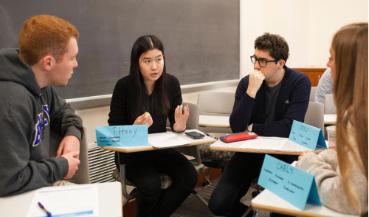Colleges Take Steps to Prepare Students for Careers

By Christopher J. Gearon
By the time senior Kristen Lundebjerg earns her degree in mechanical engineering from Boston's Wentworth Institute of Technology, she'll also have a full year of work in the field to show prospective employers. This fall, she is serving as a test director in the Energy Test Systems Area at NASA's Johnson Space Center. That follows a four-month stint with NASA's external relations office and an internship as a "design-to-value" engineer at tool company Stanley Black & Decker. Wentworth has long integrated career prep into its curriculum.
Today, a growing number of colleges are following suit. "Families and students are very focused on career readiness and career outcomes," says Paul Timmins, career services director at the University of Minnesota—Twin Cities' College of Liberal Arts and president-elect of the National Career Development Association, an organization of career counseling professionals. Meantime, governments are shining a brighter light on how well graduates are faring.
A majority of states now peg some of their funding to measures like course completion and time to degree, according to the National Conference of State Legislatures. And the Obama administration's college scorecard provides information on cost, graduation rates and the salaries of graduates. Most schools are not as far along the career-prep path as Wentworth, which requires undergrads to complete two semesters of cooperative education. Yet colleges are punching up their career education programs.
Some students are getting a healthy dose of career awareness as early as freshman year. "If they are coming into career services for the first time as a senior, it's quite possibly too late" to do much good, says Timmins. The Minnesota college has doubled the number of career counselors to 10 over the past year and assigned them to specific majors. Counselors now have more time to help students explore their interests and strengths and find internships. The 2,500 freshmen in the college all must visit career services during their first semester, write a resume and take part in an informational interview or complete a practice internship application in the spring.
High-quality career prep is far from a given, however. As families research colleges, they should "consider their return on investment," advises Susan Brennan, associate vice president of university career services at Bentley University in Massachusetts. "And that includes evaluating a school's commitment to career education and student outcomes."
The University of Notre Dame in Indiana invites all incoming students to start filling a digital portfolio with their goals, plans and samples of their best work, for example. It's voluntary, but all 8,000 undergrads took advantage during the last academic year. At Bentley, first-year students take Career Development Introduction 101, an interactive class that helps them identify personal strengths and present themselves in a cover letter, LinkedIn profile and elevator pitch. That's the first step in Bentley's four-year "Hire Education" curriculum, a program of workshops, coaching and career exploration that leads to an internship and ideally, a job.
Many liberal arts colleges now are also going all in to help students connect their classroom learning to workplace experiences, says Stacy Bingham, director of the career development office at Vassar College in New York. Some even provide funding so students can take unpaid internships. Now in its fourth year, Colgate University's summer grant program has raised $2.6 million to make such experiences possible for students who otherwise might have to wait tables or work as camp counselors to make money. Besides Vassar and Colgate, others that do the same include Colorado College, Mount Holyoke College in Massachusetts and the University of Richmond in Virginia.
Some schools have taken pains to build partnerships with employers, whose managers come to campus for educational programs and may even get involved in academic planning. The employers also hire interns or collaborate in co-op programs. Besides Wentworth, other institutions with robust co-op curricula include Northeastern Universityin Boston, Drexel University in Philadelphia and the University of Cincinnati.
In addition, Bentley, Colorado School of Mines, the University of Maryland—Baltimore County and the University of Minnesota have developed strong company partnerships. "We have an employer relations team that builds connections with employers who hire liberal arts graduates," says Timmins from the University of Minnesota. Bentley's career services staffers double as "account managers" who learn the hiring needs of the companies they are assigned to. They then match students to those needs.
"I loved CDI 101," says Alison Abrams, a 2016 Bentley math graduate, of the required career course freshman year. "I didn't know how beneficial it was until I delved into my internship." The course provided a foundation that over the next three years was followed by lots of assistance in job-search skills, attendance at networking events and career fairs, and a data analysis research fellowship at a Boston homeless shelter.
That led to a paid internship the summer after her junior year at Liberty Mutual Insurance Co., where Abrams created a tool allowing the marketing analytics team to speed through six hours of work in 10 minutes. Before senior year, she was offered a $55,000 job upon graduation that would ramp up significantly in pay after a smooth entry period.
Members of the class of 2016 who majored in science, technology, engineering or mathematics were expected to nab the highest paychecks upon graduation: an average of $55,000 to $65,000, according to the National Association of Colleges and Employers. Those who opted for business, natural resources, health care or communications were expected to land jobs around the $50,000 mark. At the top of the list? Engineering graduates, who will hit nearly $65,000. Computer science majors come in second, at $61,321, followed by math and science majors at $55,100.
"A 'C' in STEM will make you more money than an 'A' in English," says Anthony Carnevale, director of Georgetown University's Center on Education and the Workforce. A 2015 center report showed that of the 25 highest-paid majors, only two, economics and business economics, are not in STEM fields.


